Crematogaster (Crematogaster) castanea F. Smith
 Previously in subgenus Sphaerocrema. Previously in subgenus Sphaerocrema.
 Type location South
Africa (Crematogaster castaneus, Smith, 1858b: 136,
illustrated, worker & queen; type location wrongly given as
"Albania") - see below Type location South
Africa (Crematogaster castaneus, Smith, 1858b: 136,
illustrated, worker & queen; type location wrongly given as
"Albania") - see below
- for
subspecies, varieties and synonyms see below
all forms known (see Bolton, 1995)  . .
|
Type form
Smith's (1858b) description is at  . Arnold (1920a: 488) has a transcription,
this is at . Arnold (1920a: 488) has a transcription,
this is at  - note Arnold obviously took Smith's type
location of "Albania" as correct - Smith's simultaneous description of Cr.
arborea (see below) matches the photographed specimen and was given
as from Port Natal, South Africa, collected by Herr Gueinzius. - note Arnold obviously took Smith's type
location of "Albania" as correct - Smith's simultaneous description of Cr.
arborea (see below) matches the photographed specimen and was given
as from Port Natal, South Africa, collected by Herr Gueinzius.
Smith wrote of this as head and alitrunk
rufo-ferrunginous, gaster brownish-black, with the base obscure
rufo-fuscous.
As can be found under Crematogaster
(Cr.) tricolor, I have separated off tricolor, or
rather reverted the situation, as it was when first described. The
listing below, therefore is limited to the unicolorous forms reported
mainly from southern Africa.
|
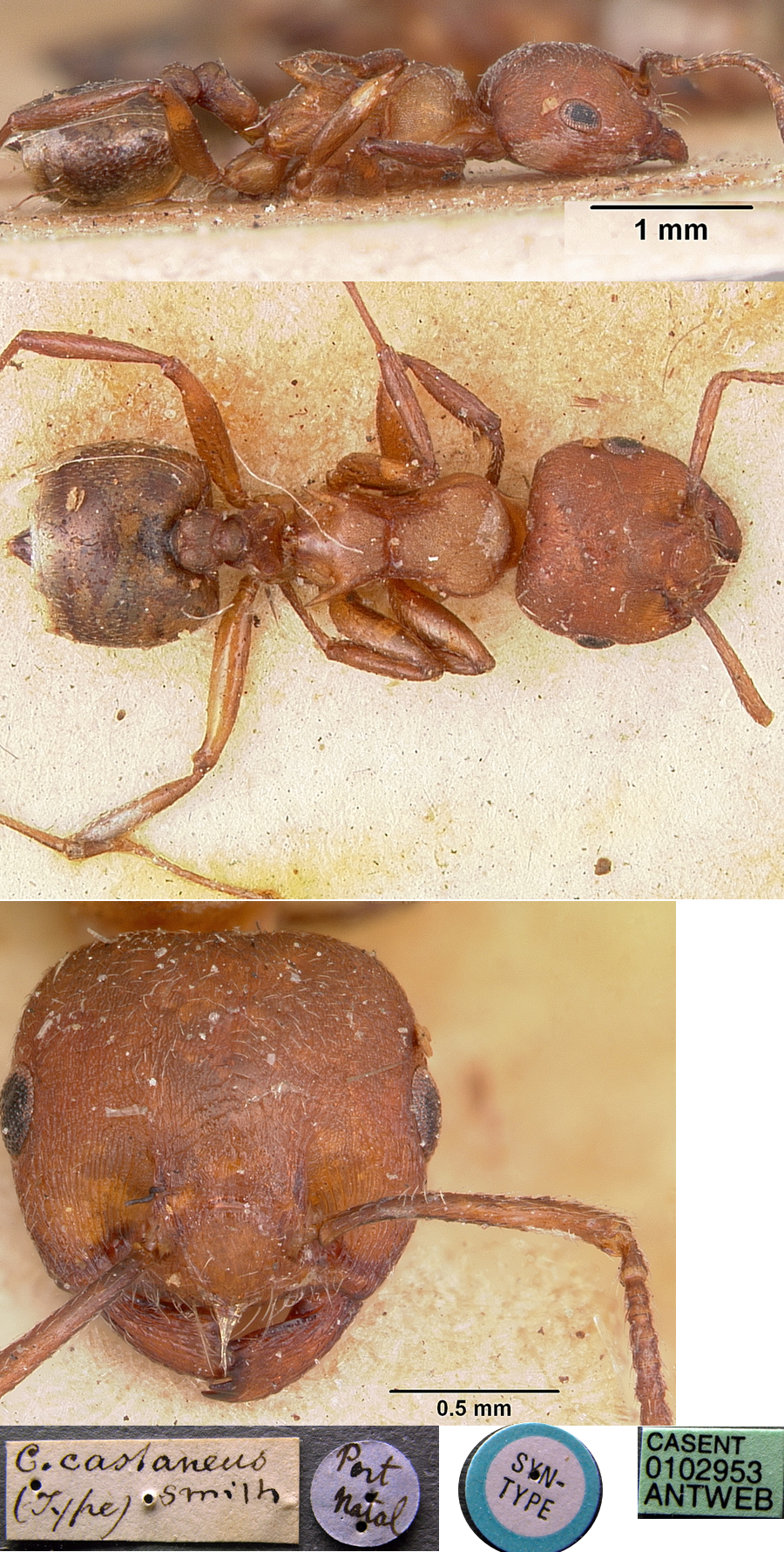 The photomontage of
a syntype is collated from http://www.antweb.org/specimen.do?name=casent0102953 The photomontage of
a syntype is collated from http://www.antweb.org/specimen.do?name=casent0102953
|
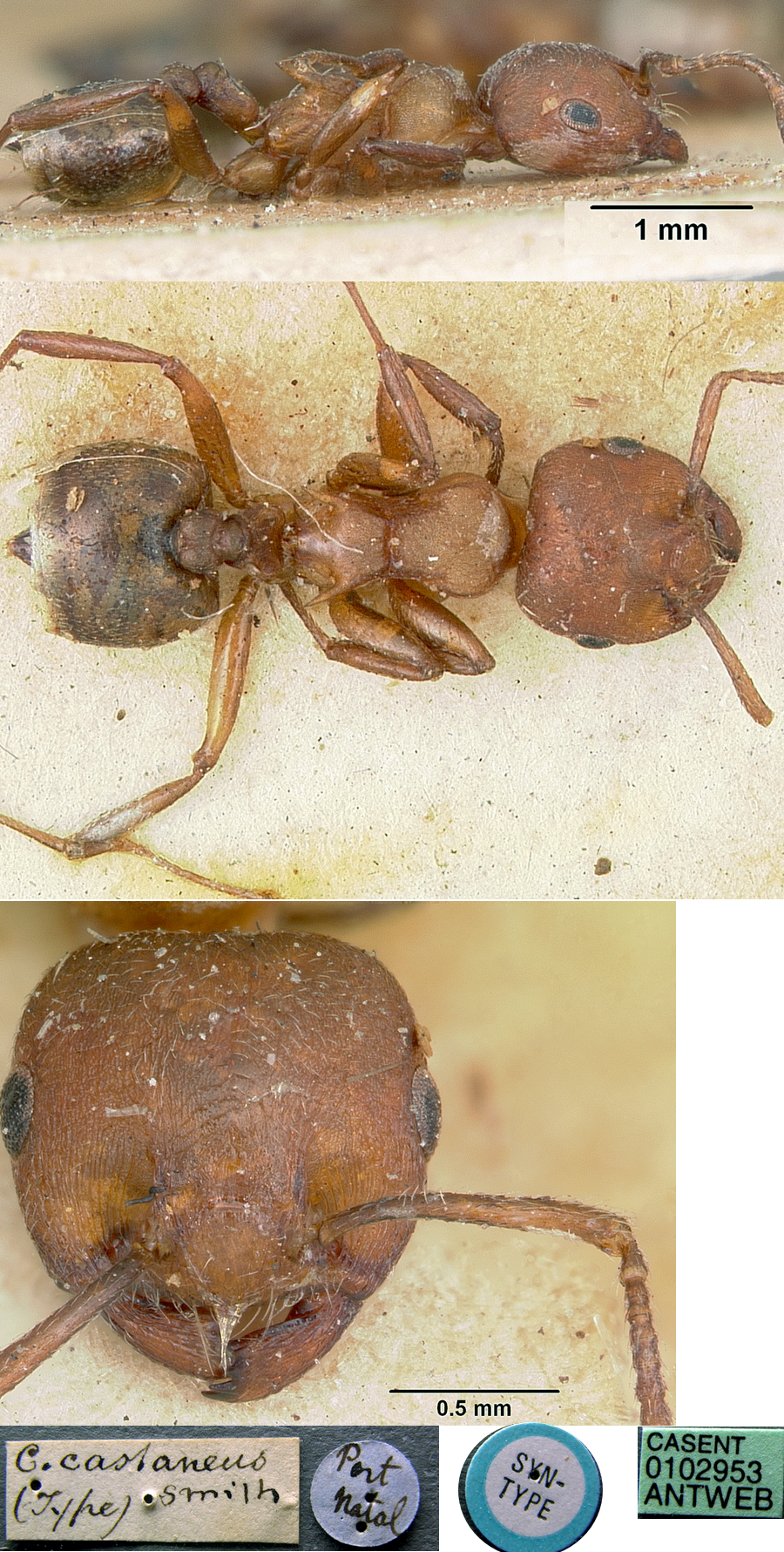 The photomontage of
a syntype (as above) is colour adjusted to (hopefully) be nearer the
Smith description. The photomontage of
a syntype (as above) is colour adjusted to (hopefully) be nearer the
Smith description.
|
junior synonyms (here) - click images to
see full version
|
|
|
inversa (Crematogaster
tricolor var inversa n var, Forel, 1907g: 81, worker;
Emery, 1912c: 2, queen & male; Santschi, 1930b: 69, queen &
male). Forel's (1907g) description is on  . Emery's description (1912c) of inversa
queen & male is at . Emery's description (1912c) of inversa
queen & male is at  . See http://www.antweb.org/specimenImages.do?code=casent0908508 . See http://www.antweb.org/specimenImages.do?code=casent0908508 |
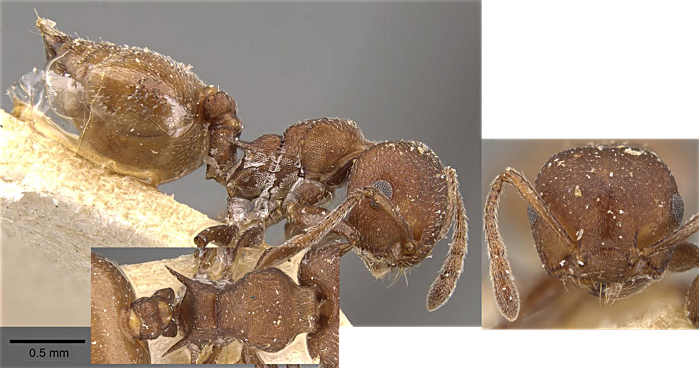
|
Kenya |
 arborea (Crematogaster arboreus, Smith,
1858b: 138, plate of nest, worker; Mayr, 1866b: 900, description,
illustrated petiole of worker; junior synonym decolorata,
Santschi, 1926b: 213, worker) - this status is confused as Emery 1922e:
147), accepted by Wheeler (1922: 840), had the Mayr specimen as being
the same as, or a subspecies of, Cr.
melanogaster Emery arborea (Crematogaster arboreus, Smith,
1858b: 138, plate of nest, worker; Mayr, 1866b: 900, description,
illustrated petiole of worker; junior synonym decolorata,
Santschi, 1926b: 213, worker) - this status is confused as Emery 1922e:
147), accepted by Wheeler (1922: 840), had the Mayr specimen as being
the same as, or a subspecies of, Cr.
melanogaster Emery
Smith's
(1858b) description of arborea is at  Mayr's (1866b) illustrated (petiole)
description is at Mayr's (1866b) illustrated (petiole)
description is at  . Mayr's further description (1896) is at . Mayr's further description (1896) is at  . It was transcribed and Mayr's (1896)
description translated by Arnold (1920a: 506-7) these are at . It was transcribed and Mayr's (1896)
description translated by Arnold (1920a: 506-7) these are at  It seems, however, that Arnold had not
seen Mayr (1866b); see below for Santschi (1926b) It seems, however, that Arnold had not
seen Mayr (1866b); see below for Santschi (1926b) |

|
South
Africa |
bruta (Crematogaster tricolor stirps ferruginea v. bruta n. var., Santschi, 1913a:
413,
worker; as Crematogaster castanea
Sm. stirps bruta Santschi, in
Santschi, 1926b: 213; named in key only in Santschi
(1913a); see below for Santschi, 1926b)
see http://www.antweb.org/specimenImages.do?code=casent0912648
|
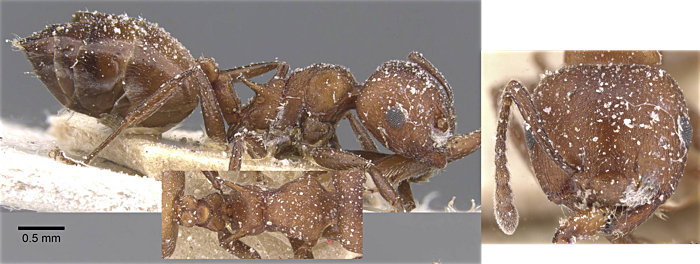 |
South
Africa |
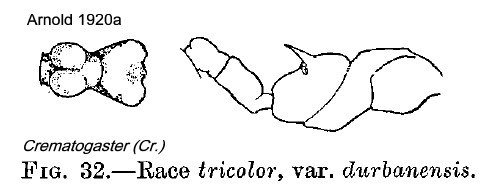 durbanensis
(Crematogaster ferruginea For.
v. durbanensis n. v., Forel,
1914d:
234, worker; Arnold, 1920a: 491, queen) - see http://www.antweb.org/specimenImages.do?code=casent0908505 durbanensis
(Crematogaster ferruginea For.
v. durbanensis n. v., Forel,
1914d:
234, worker; Arnold, 1920a: 491, queen) - see http://www.antweb.org/specimenImages.do?code=casent0908505
Forel's (1914d) description is at  ; see below for Arnold's
(1920a) translation ; see below for Arnold's
(1920a) translation
|
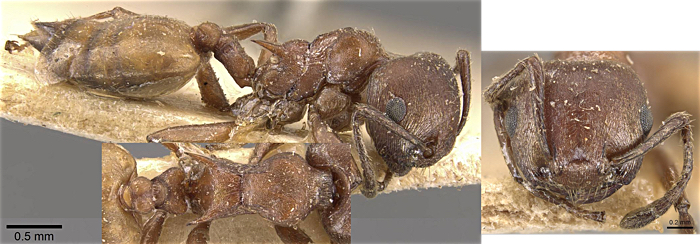
|
South
Africa |
rufonigra (C. tricolor Gerst., sous-esp. rufonigra, n. sp., Emery, 1895h:
27, worker; Arnold, 1920a: 492, queen & male) http://www.antweb.org/specimenImages.do?code=casent0904512
Emery's description (1895h) of rufonigra
is at  ; "may be it is C. castanea" ; "may be it is C. castanea" |

|
South
Africa |
decolor (Cremastogaster tricolor Gerstacker,
var. decolor nov. var.,
Forel, 1891b; 188, worker) - see https://www.antweb.org/specimenImages.do?code=casent0919663
Forel (1891b) had only a brief note at the end of a re-description of Crematogaster
tricolor - variety decolor nov. var. Workers of a variety
smaller than the (tricolor) type worker, with a narrower
petiole, the colours duller, less contrasting, was collected in the
forests by M. Humblodt. |
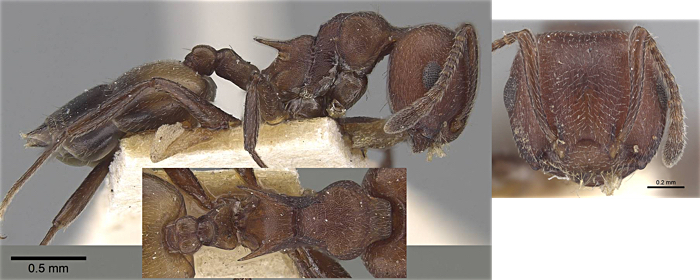 |
Madagascar |
quisquilia (Cremastogaster castanea Sm. stirps rufonigra E., var. quisquilia n. var., Santschi,
1916b: 502, worker) - see http://www.antweb.org/specimenImages.do?code=casent0912657
Santschi (1916b) briefly noted -
worker of a brighter red than rufonigra Em., the base of the
gaster is rust and the appendages more obscure; the sculpture is much
more defined with the longitudinal rugae more or less distinct whereas
they are missing in rufonigra. Apart from the dark gaster this
is an eact match for the type worker (above) |

|
Zimbabwe |
|
|
 Other descriptions translated by Arnold (1920a: 506-7) are
of simia (Forel: 1910f) and (illustrated) durbanensis
(Forel, 1914d) at Other descriptions translated by Arnold (1920a: 506-7) are
of simia (Forel: 1910f) and (illustrated) durbanensis
(Forel, 1914d) at  and quisquilia (Santschi, 1916b), bruta
(Santschi, 1913a) and ferruginea (Forel, 1892e) and quisquilia (Santschi, 1916b), bruta
(Santschi, 1913a) and ferruginea (Forel, 1892e)  . Santschi (1926b) deals with several
varieties, these are at . Santschi (1926b) deals with several
varieties, these are at  . .
Forel (1911f) reported inversa and castanea,
both as varieties of inversa, from Zaïre, Kasai, Kondué by Luja.
A drawing of the C. castanea arborea nest was
given by F Smith (1858b) on  . A description and
drawing of C. castanea hararica and a nest was given by Mayr
(1907b) on . A description and
drawing of C. castanea hararica and a nest was given by Mayr
(1907b) on  . .
Collected by Room (1971) from all parts of the Mampong
Cemetery cocoa farm in Ghana, his report includes reference to
it ("very close to Cr. striatula") as nesting in cocoa canopy.
It also occurred in 34 of his 168 canopy samples at other farms; 30 of
those samples were from trees selected for the presence of Oecophylla
longinoda as a dominant, and Room described its very close
association with O. longinoda. Room also reported its
occurrence on cocoa mistletoe - being fifth most abundant insect, with
3,228 workers, from less than 30 of 630 samples of the mistletoe/cocoa
junction (unranked) (Room, 1972a, b, 1975). Leston (1973) also regarded
it as sometimes a dominant but mutually tolerant of O. longinoda.
Found on cocoa at Kade by Majer, who found it in 61.1% of his 144 pkd
samples at Kade, with 200-400 workers per sample (1975, 1976a, b, c).
It is probably among the list of Strickland (1951a). Bigger (1981a)
recorded its distribution and abundance on a single area of Amelonado
cocoa at CRIG, where small numbers were collected by pkd from areas
dominated by Oecophylla longinoda.
I suspect that the species from Ghana was not true castanea
but resolution will have to await examination of actual specimens.
Possibly Crematogaster (Cr.) rufimembrum (August 2016)
|
|